Finding Family
An unexpected Christmas gift.
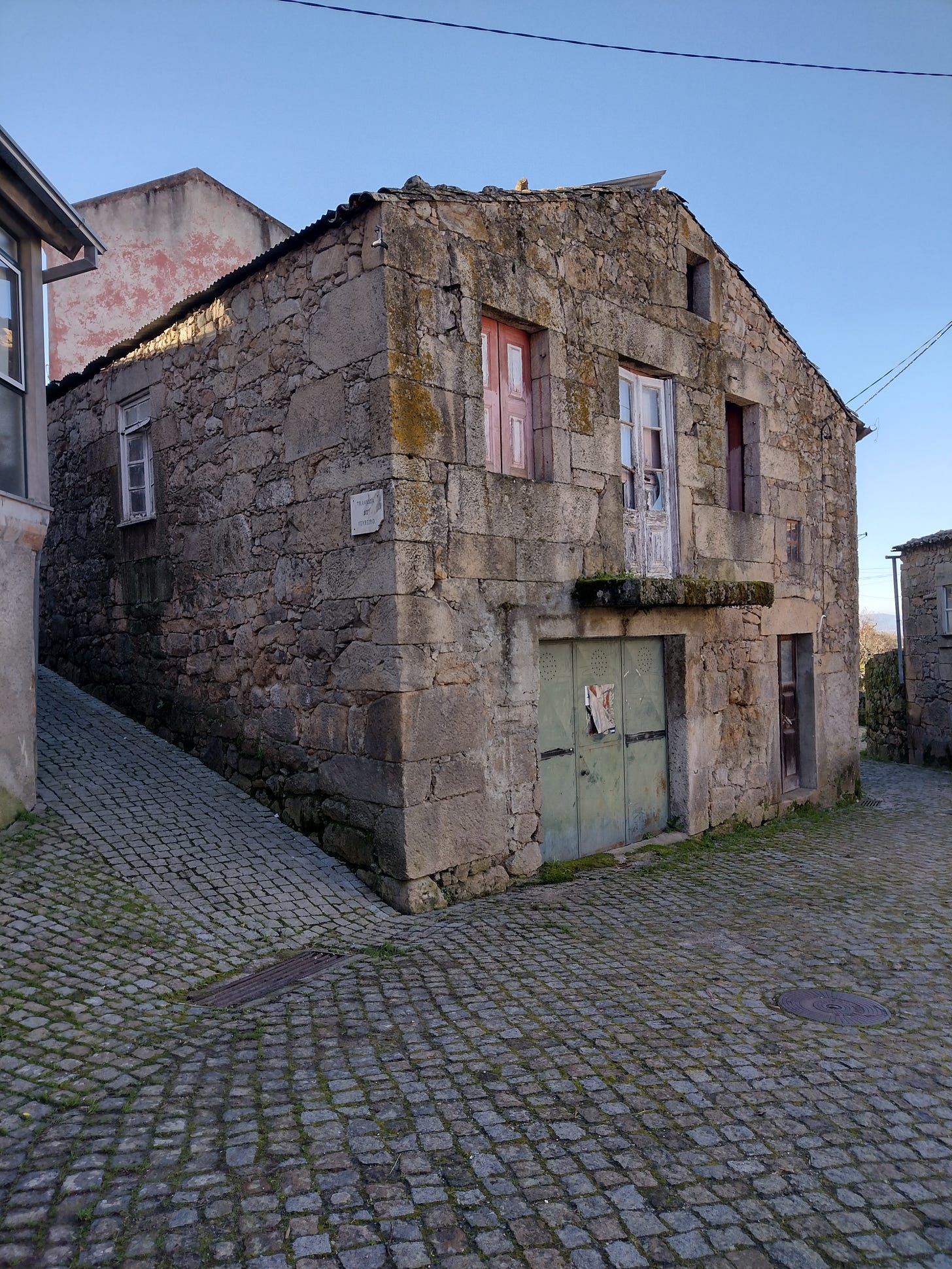
One of the reasons Paul and I moved to Portugal was so I could be boots-on-the-ground to research my Portuguese ancestry. But admittedly, I haven't done as much of that research as I had planned. Now that I am not working full time, I thought I would have more time to spend poring over documents that could offer me clues to the past, but alas, life often gets in the way. Or maybe it's plain old procrastination (who am I kidding – that’s exactly what it is).
However, all that changed for me over the Christmas holiday when I unexpectedly stumbled upon family in Portugal.
Visiting Viseu.
For the 2023 Christmas holiday, Paul and I decided to explore the small city of Viseu and the surrounding area. Viseu is located about 3 ½ hours north of where we currently live and is in the area known as the center of Portugal. It is also part of the Dão wine region (excellent wines). We stayed for 6 nights at the Pousada de Viseu, which is an historic building that was the former S. Teotonio Hospital dating back to 1842. The Pousada has been completely restored and is a 4-star hotel run by the Portuguese hospitality company, The Pestana Group.
My Portuguese roots.
Both sides of my family – paternal and maternal - have Portuguese roots. My grandparents were all born in Portugal – the paternal side in the Azores, the maternal side on the mainland. My grandparents all emigrated to the United States as young adults in the early 1900’s. They met their spouses in the United States (all of whom were Portuguese immigrants), married, and raised children. They are all buried in cemeteries in Rhode Island and Massachusetts, and with the exception of a few visits, they never returned to their roots in Portugal.
My parents were born in the United States and they grew up speaking English as well as Portuguese. But the only time my parents spoke Portuguese in front of us kids at home was whenever they didn’t want us to know what they were talking about. In the 1950’s-60’s learning the ancestral language was not something that was practiced or encouraged. After all, we were Americans. And even though I studied Portuguese in college, I never had anyone to speak it to, so I am left with remembering only a few random words and phrases.
A small village.
Growing up, I had often heard about the small village that my maternal grandmother was born in and the place where her mother, my great-grandmother had lived for most of her life.
My great-grandmother was named Marianna de Almeida Nogueira and I believe that she lived in this village for most of her adult life, although she did spend some time in the U.S. with her son, (my great-uncle) who emigrated to the United States as a teenager. Census records from Rhode Island indicate that Marianna arrived in America in 1918. Her son who was born in Portugal in 1903 was listed as a relative. Marianna was born in 1876 (approximately). I have not been able to find any information yet as to when she returned to Portugal, but I do know that she did return at some point.
Although I don’t have much information about my maternal great-grandfather, I do know his name was Manuel dos Santos Loureiro. According to a family obituary, my great-grandfather father died approximately in 1911.
In consideration of the privacy of my ancestors, village residents, and relatives, I’m not going to pinpoint exactly where this village is, but the largest city closest to it is Guarda. The village is about an hour northeast of Viseu by car, accessible by a highway and then a winding, two-lane modern road that goes through part of the Serra de Estrela Mountains. I had read somewhere that this village currently has about 50 inhabitants. It is definitely not a tourist spot.
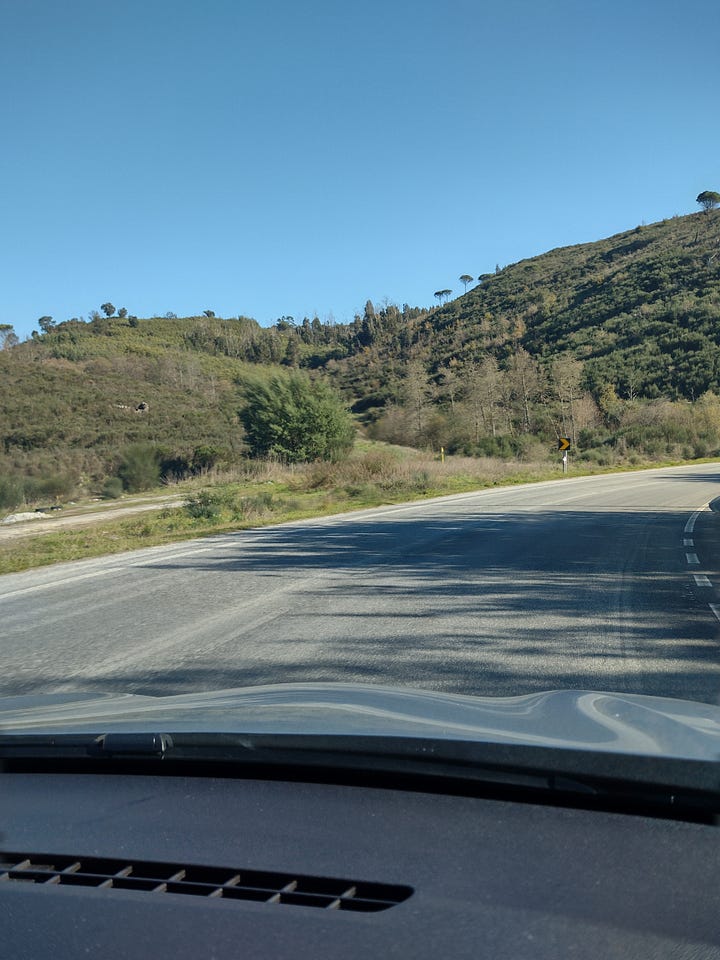
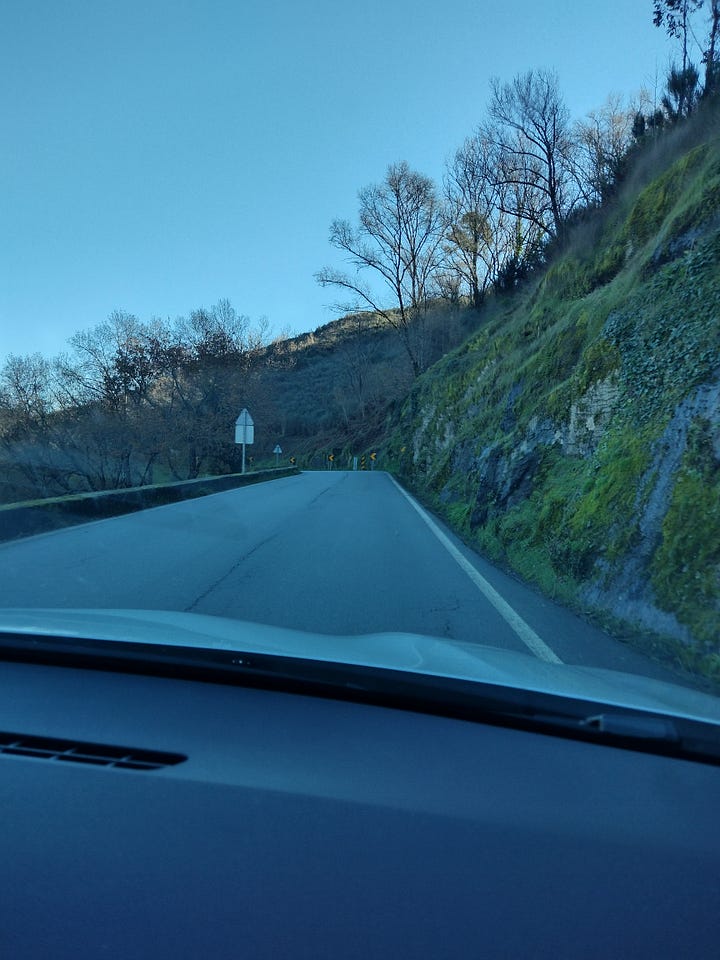
The terrain is beautiful with the surrounding mountains, crystal clear water pouring through the mountain rocks, vineyards, and farmland. Driving through this region, I could understand why my maternal grandmother always liked the mountains of Vermont, as it must have reminded her of her homeland.
We weren’t sure we would be able to visit the area at this time of the year because we were told that the roads can turn icy and there could be snow. But during our stay, the weather was sunny, and the temperatures were relatively mild. So, we decided to take a chance and see if we could find the village. My goal for this trip was just to see the village where my grandmother (I called her Nana) was born. I didn’t have very much information to go on. I just wanted to go there, take a few pictures to send to my family, and get a sense of this part of my heritage.
After about an hour on the road from Viseu, we saw a white sign on a corner indicating the way to get to the center of the village. It was obviously a small, rural area. There were older, abandoned stone dwellings interspersed with newer dwellings. There was farmland and fields. We approached what we thought was the center of the village. One way to tell if you are in the center of an old village in Portugal is if you see an area – usually tiled and with a spigot - for residents to draw spring or mountain water for drinking. We found one in this village, so assumed we were in the right spot.
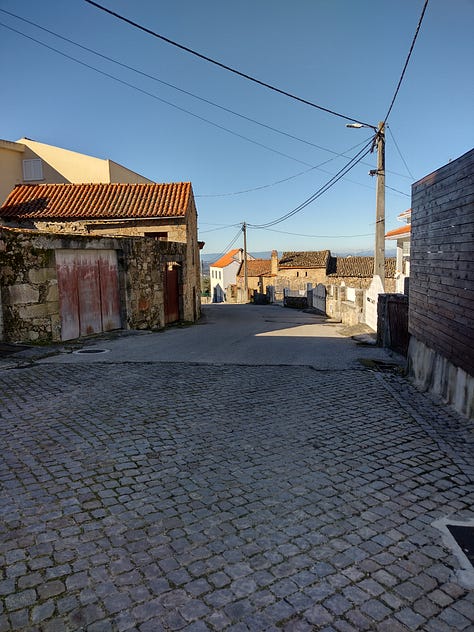
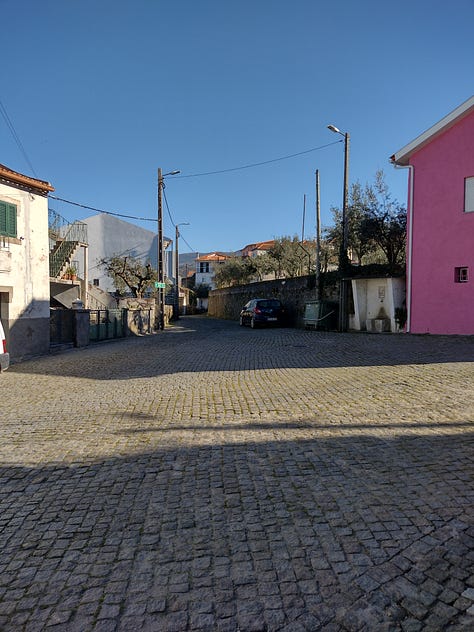
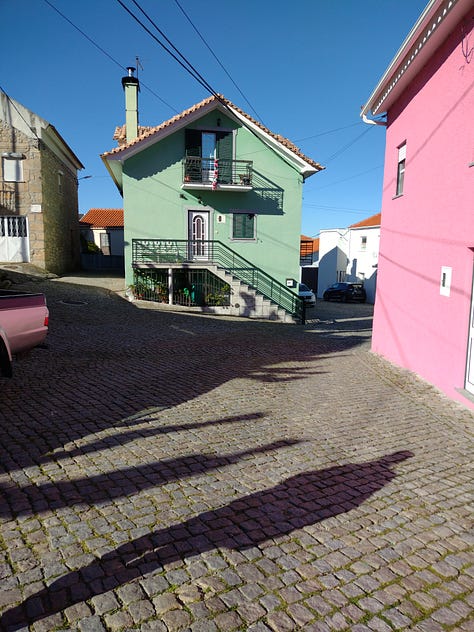
Paul parked our car along the side of a lane, and we got out. We began walking around (we had no idea as to which direction to go in), and we started taking a few pictures. For me personally, I could not believe I was here! I cannot exactly describe how I was feeling but it was somewhere between being calm, anxious, and curious.
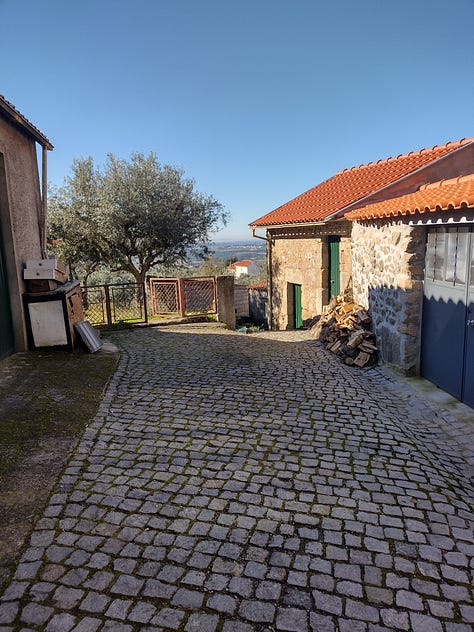
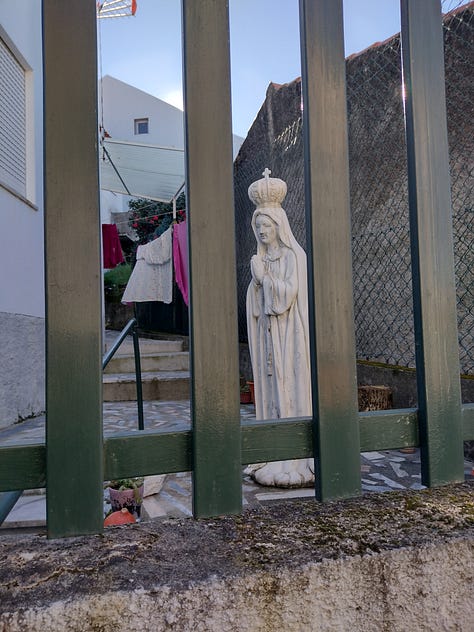
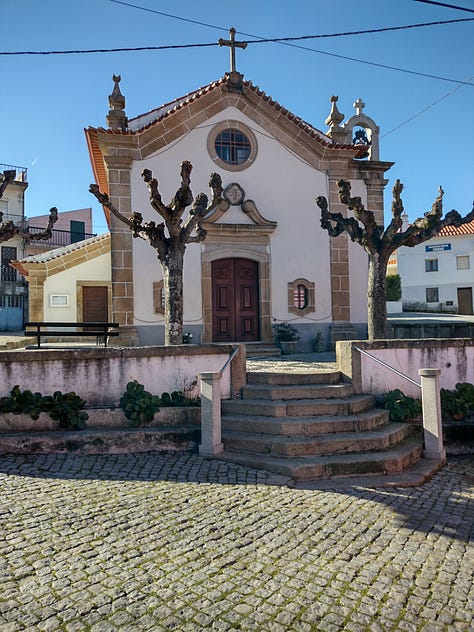
Warning, Warning, Danger: There are strangers in town!
As we were walking around taking photos, a middle-aged man in a green pullover walked past us. He would not look directly at us, but mumbled, “Boa tarde” (Good afternoon) as he walked past us. We both responded with “Boa tarde” and watched as he walked over to what looked like a small (and possibly only) village café.
Less than two minutes later, a middle-aged woman in a blue sweater came out of the café and started walking toward us. It immediately occurred to us that these folks do not normally see strangers in town – especially strangers taking random photos!
She came right up to me. She was polite but had a look of concern on her face. She began to speak to me in Portuguese. My Portuguese is terrible, and she spoke no English. But I knew she was asking me if we needed help with something. I immediately got out my cellphone, and using my translation app, I told her that my grandmother had been born in this village, and I just wanted to see it.
The woman stared at me with a look of complete surprise on her face. And then, suddenly and without any advance warning, I started to cry. I apologized to this woman and thought she must think I was a complete idiot! I tried to compose myself and then she just looked at us and motioned for me and Paul to follow her into the café. We were hoping that she was leading us to someone who might speak a little English but that wasn’t the case. No one spoke English. Paul and I stood inside the building while the man in the green pullover, another man who appeared to be the café owner, and another woman looked at us as if they did not know what to do with us.
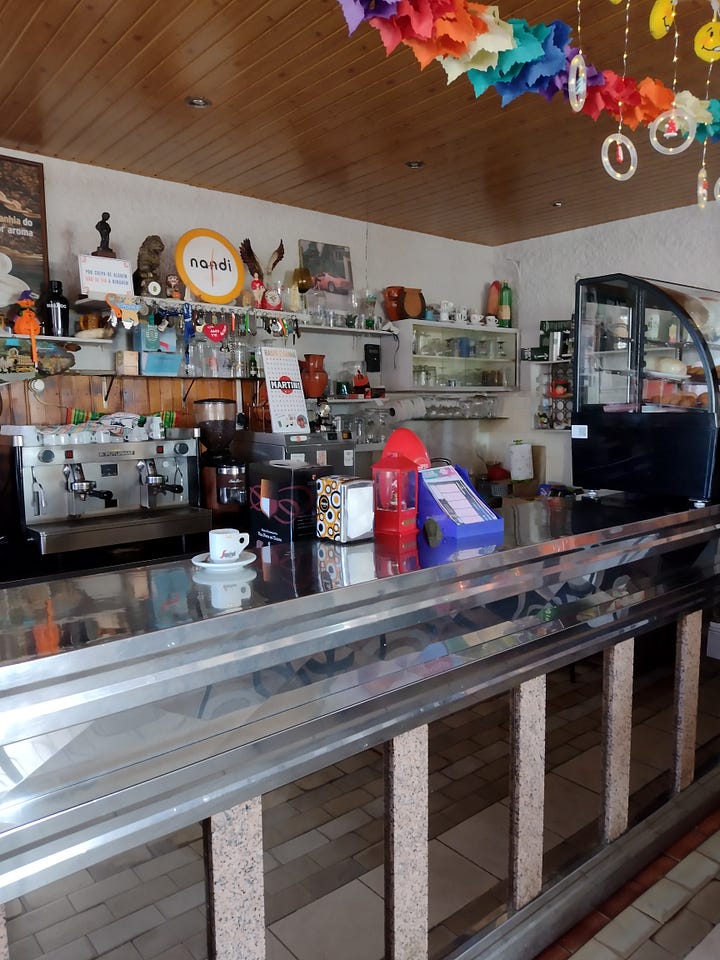
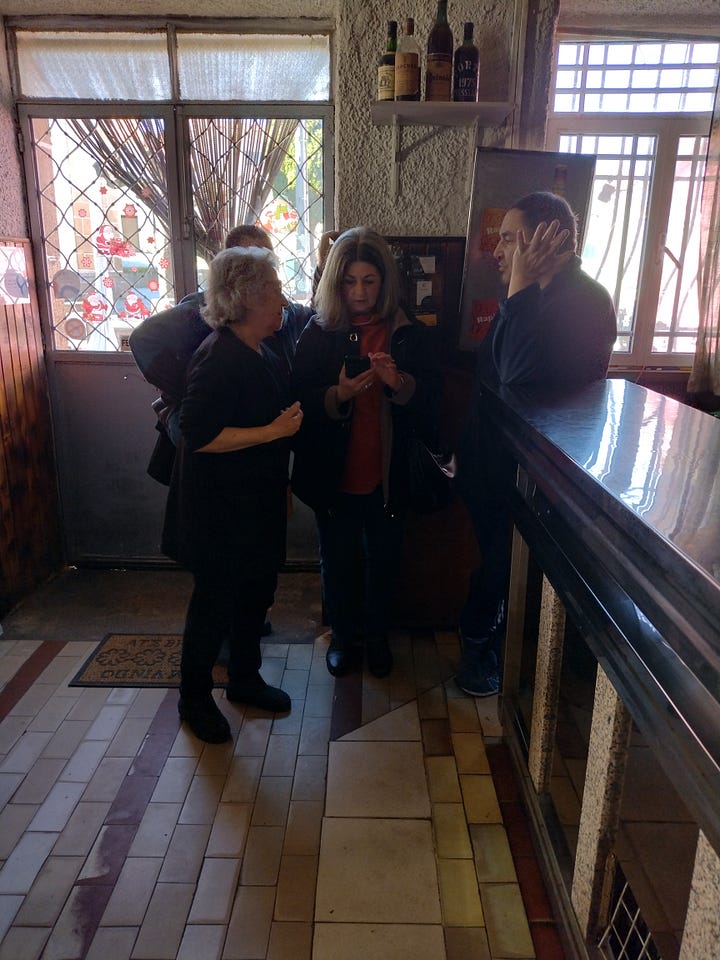
The woman who brought us into the café, told the café owner that I had said my grandmother had been born in this village. I could see suspicion and doubt start to creep up on everyone’s faces. At this point, both Paul and I are frantically using our translation apps to try to communicate with these folks. I was asked the name of my grandmother. I blurted out, “Maria Almeida” (completely forgetting that there is more than just a first and last name used in Portugal). Then, they asked if I had a fotografia (photograph) of my grandmother.
I was completely unprepared for this, and I muttered this exact sentiment to myself under my breath as I hoped to be able to pull up some proof of my grandmother on my phone (no wifi signal whatsoever). I suddenly remembered that I had a scanned copy of a passport of Nana stored in my meager Ancestry file in the cloud.
Around 1930, my grandmother left America with her three young daughters (my mother being the youngest - perhaps one or two years old), to live for a few years with her mother – my great-grandmother, Marianna - in this village. My grandmother had wanted to get away from her husband (my grandfather) because he had a temper and she had had enough of him (Nana was fiercely independent). The passport was from 1935 and it was a Portuguese passport, good for one year and issued so that Nana could return to America with her daughters. My grandmother did not become a U.S. naturalized citizen until 1941.
Who is in this Fotografia?
Using my phone, I showed everyone the photo. The woman in the blue sweater who brought us into the café asked me if the woman in the passport photo was my grandmother (Maria do Ceu1 Almeida Loureiro). I said, “Sim” (Yes). A major discussion ensued (all in Portuguese) among the people standing around us. The man who owned the café shook his head and said I was looking in the wrong village. Another woman (I assume the café owner’s wife) shook her head in agreement with the man. But the woman who had brought us into the café began to argue with them and kept saying “Maria do Ceu” over and over. The café owner and wife kept shaking their heads and saying “Nao” (No). At this point, I started to get teary-eyed again – this was all quickly becoming overwhelming for me, and I didn’t know how to delicately get out of this situation.
But then, I became a bit more insistent. Using my translation app, I took a deep breath and then I said that I was in the right place and that my family had always mentioned this village. I also said, “I’ve been looking for a long time.” I showed each person what I had written on the translator. They became noticeably quiet.
The quiet was short-lived as more skepticism continued among the group – I could feel it. I felt like there was more to this, but I couldn’t exactly pinpoint what. Something changed after I insisted that I was in the right place. Then the woman who brought us into the café said to the group in Portuguese (as if she were admonishing them), “She’s looking for her family.”
No doubt about it. I’m coming back.
A younger woman came into the café (another relative of the café owner I assume – I think everyone could be related here) - and although I think she knew some English, she refused to speak to us in anything but Portuguese (I completely respect this and this experience has motivated me to be more diligent in learning Portuguese).
She had a translation app on her cellphone and through it she told me I might be able to find more information about any of my ancestors who may have lived in this area, at the municipal building in a larger town nearby, as that’s where all the documents are kept for the small network of villages in this region. She said that the municipal office was closed but would reopen at 2:00 pm (not that I was planning to rush over there that day). I responded saying I had already assumed that was where I could find more information, and then using the translation app again, I said to them all, “I will come back here with more information. And I will also bring someone with me who can speak Portuguese.”
I think at that point, they all knew I was serious, and I wasn’t going to let this go.
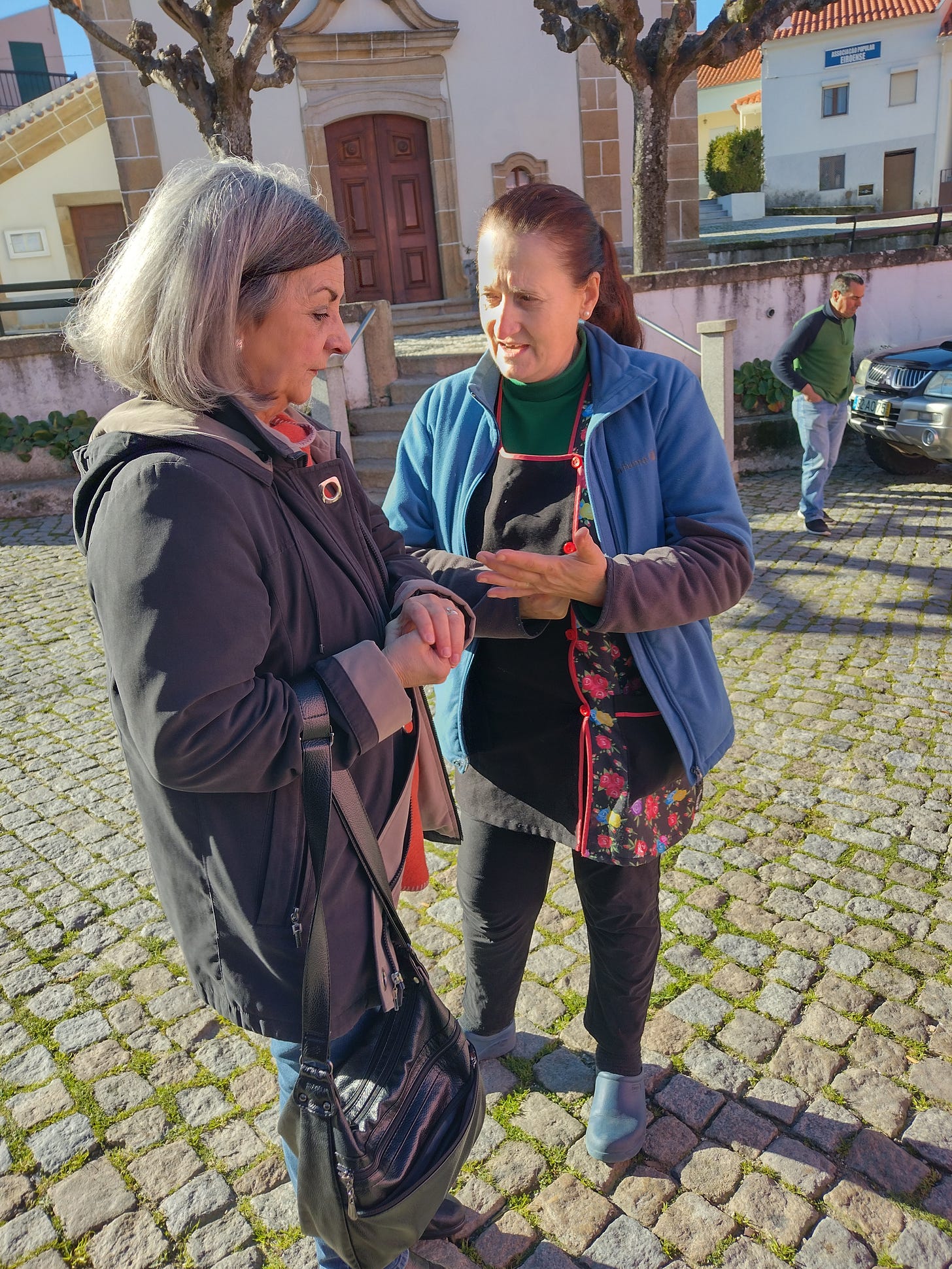
Obrigada. For now.
I thanked them all (“obrigada”) and Paul and I walked out of the café. The woman who had brought us inside, also walked out, along with the man in the green pullover. At this point, we assumed they were spouses - I had not yet asked their names. I thanked her again and started to walk back towards our car. But she just looked at me as if she were considering something and then suddenly indicated to me to follow her. So, I did, with Paul and the man in the green pullover trailing behind us.
We walked down some narrow lanes. I had to walk fast to keep up with this woman. There were more old stone dwellings – some in complete disrepair - and there were newer or restored dwellings that were obviously occupied homes.
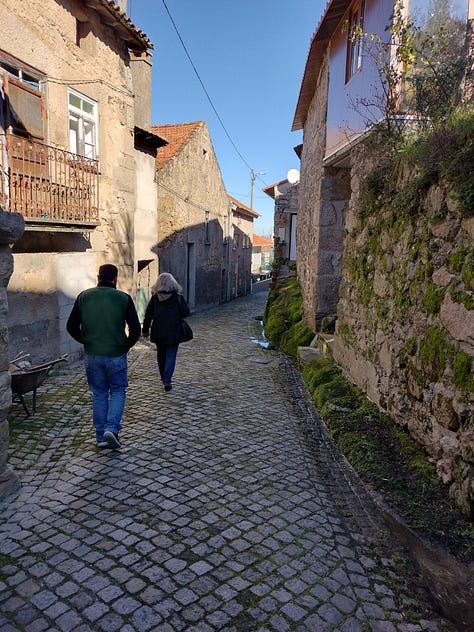
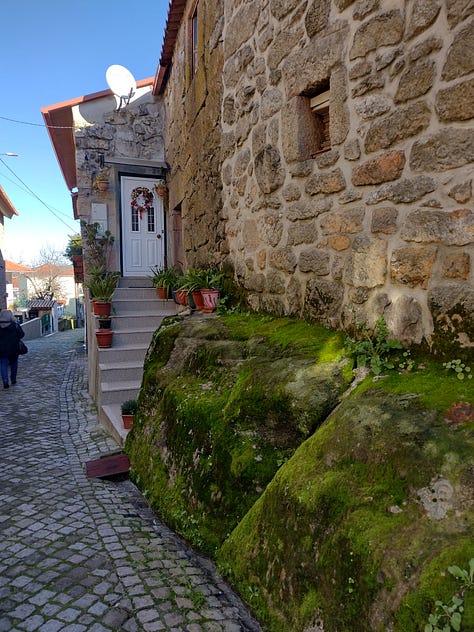
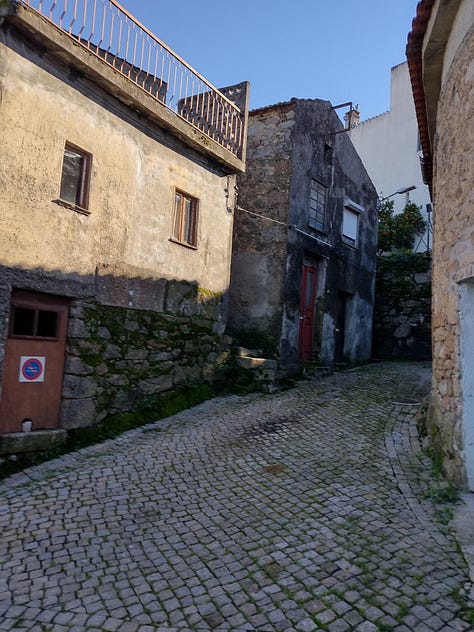
We walked silently on for a few minutes more. Then we turned a corner and the woman started to call out to someone in one of the occupied homes. An older woman came out of her house (it was weird - she resembled my Nana) and there was yet another conversation in Portuguese. It was obvious that the two women were discussing the name, Maria do Ceu and also the reason why I was standing there. I believe that the woman wanted to concur with this second woman that indeed Maria do Ceu was born in this village. I asked the first woman if this second woman was her tia (aunt). She told me they were primas (cousins).
My unexpected Christmas gift.
It was then when the woman in the blue sweater looked at me, smiled, gave me a hug, and said, “A minha família.” (You are my family).
I was in shock! Then she pointed right across the street to a large stone house. “This is where your grandmother was born,” she said to me in Portuguese. I was in complete disbelief – not because of the condition of the house (it’s a ruin) – but because I had traveled all this way and never expected that I would actually get to stand in front of the house where most likely my Nana was born and where my great-grandparents had lived, and where my mother probably played as a little girl during the one and only time she was in Portugal. I could feel something - perhaps an energy or a presence - I’m not sure. It was a surreal experience for me, but whatever it was, I could not have asked for a better Christmas gift!
Finally, I asked the woman in the blue sweater what her name was. She told me her name, and when she said her surname was Loureiro, I knew right then that she and I are most likely related through my great-grandfather’s side (Loureiro).
There’s more to this story.
This is a somewhat abbreviated version of my story about finding family in Portugal. There’s actually more to it and I have shared that with my family and a few close friends. During my brief visit, my new-found relative and I had more conversation and although I could not understand everything, I understood enough. Sometimes emotions and nuances say more than words.
There’s a question of how this house came to be currently owned by the café owner. My relative insisted that I take down the name of the street the house is on. It is still unclear to me if the café owner is also my relative and if so, who is he, how are we related, when did he acquire the house, and who is his family. I am curious to learn more about this part of my ancestry. There is also a connection somewhere with this village, my ancestry, and Argentina – something I was not aware of until my conversation with her. This will also have to be researched.
No more procrastination!
This unexpected encounter has motivated me to set time aside to research more. I have asked my family for any photos or documents (or even recollections of conversations) they may have with or about our shared ancestors. I have found more ancestry research tools to use and will pay at least one visit to the municipality where I believe many of the records I am searching for are kept.
Paul and I plan to return to the village sometime in the future. I will bring more information and I will bring someone who speaks Portuguese. This story is not over. Stay tuned…
Thank you for reading Our Portugal Journey. This blog is a subscriber supported publication but has no paywall – in other words, you can subscribe for free and receive all the content. However, if you find my content valuable, please consider becoming a Supporting Subscriber for a nominal fee either on a monthly or annual basis right here. Just want to buy me a glass of wine? You can do that here.
A special thank you to Gillian V. and to Tania for supporting Our Portugal Journey through Buy Me a Coffee. I truly appreciate it!
Until next time…
Obrigada!
Carol.
Do Céu – Means ‘of sky’ or ‘heaven’.


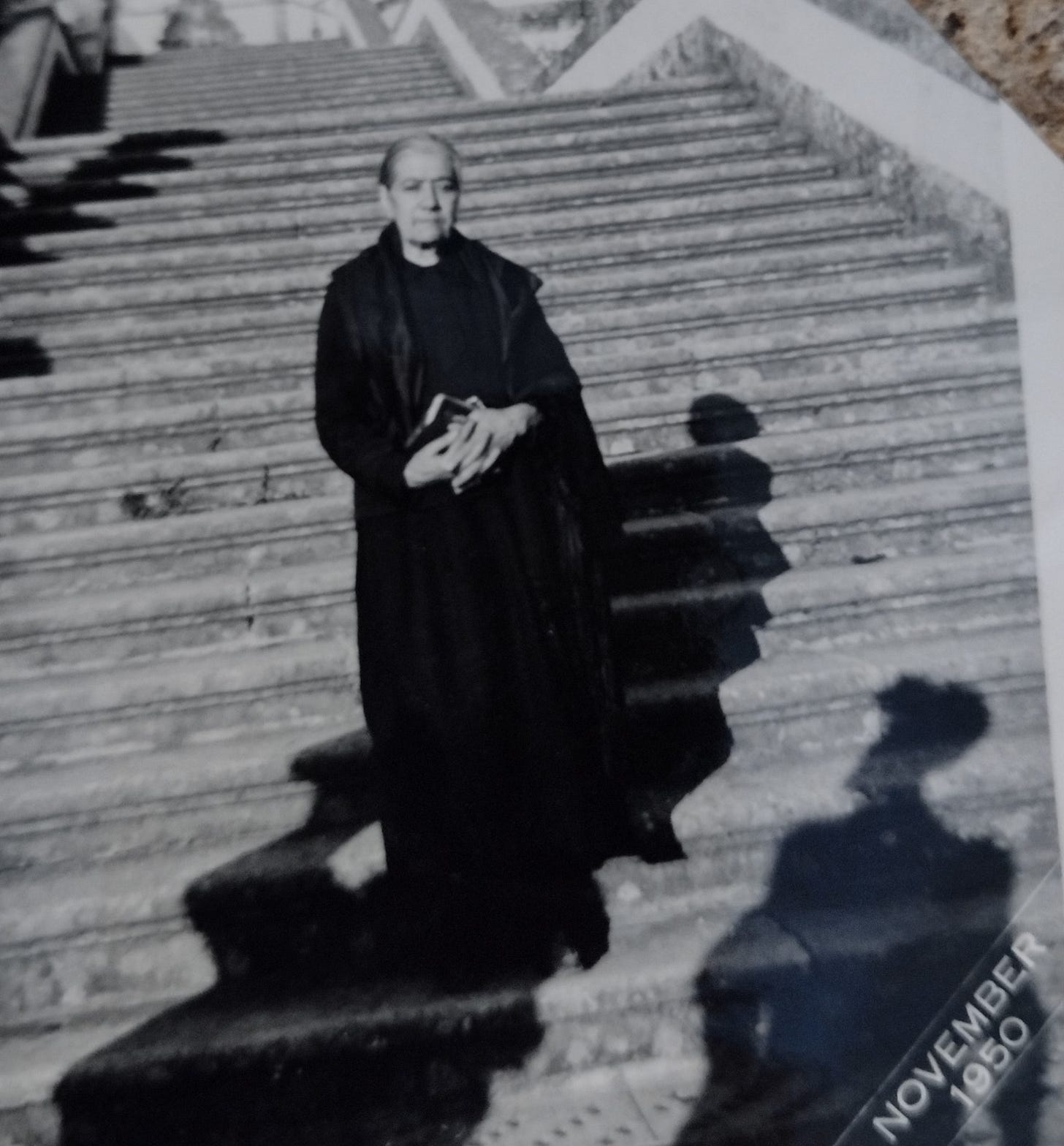
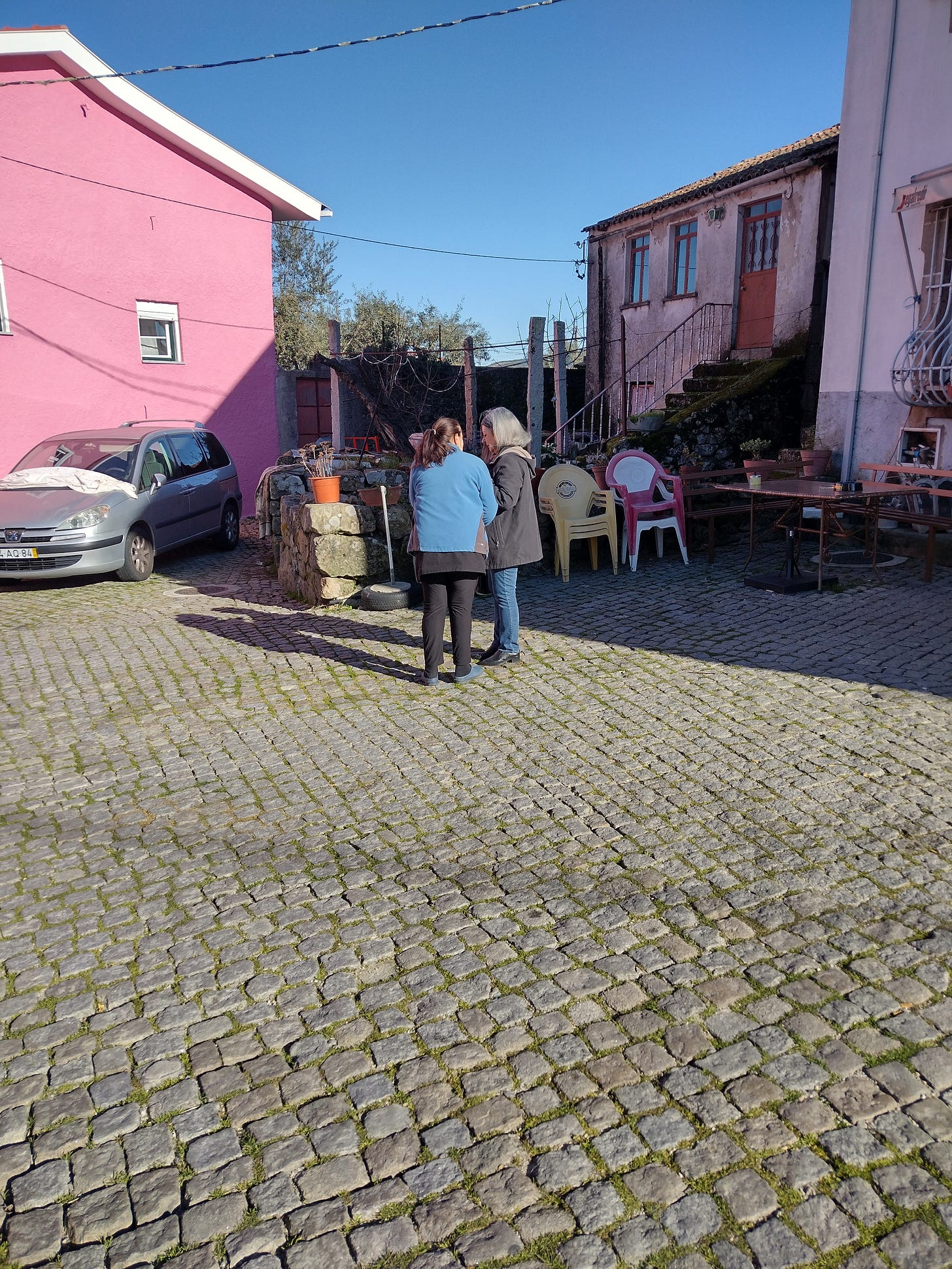
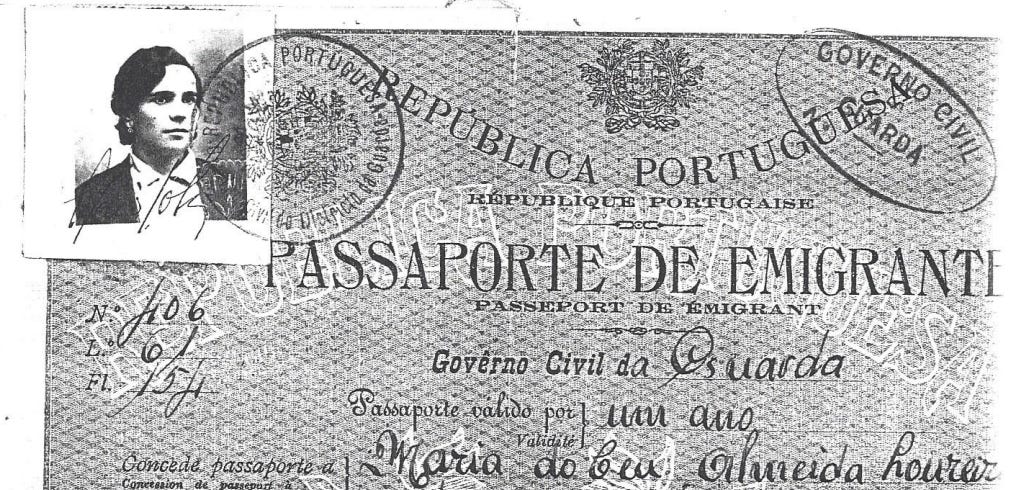
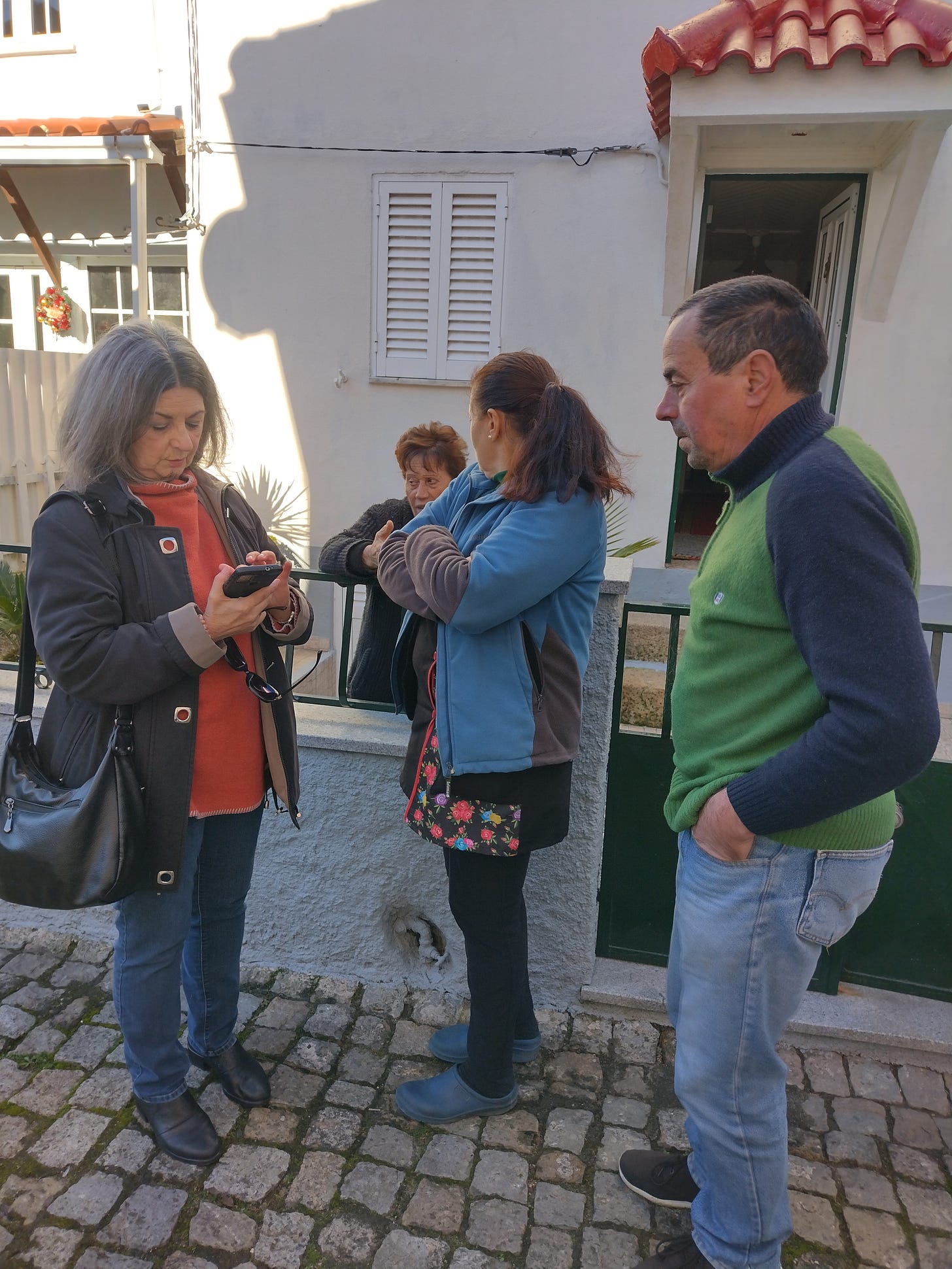
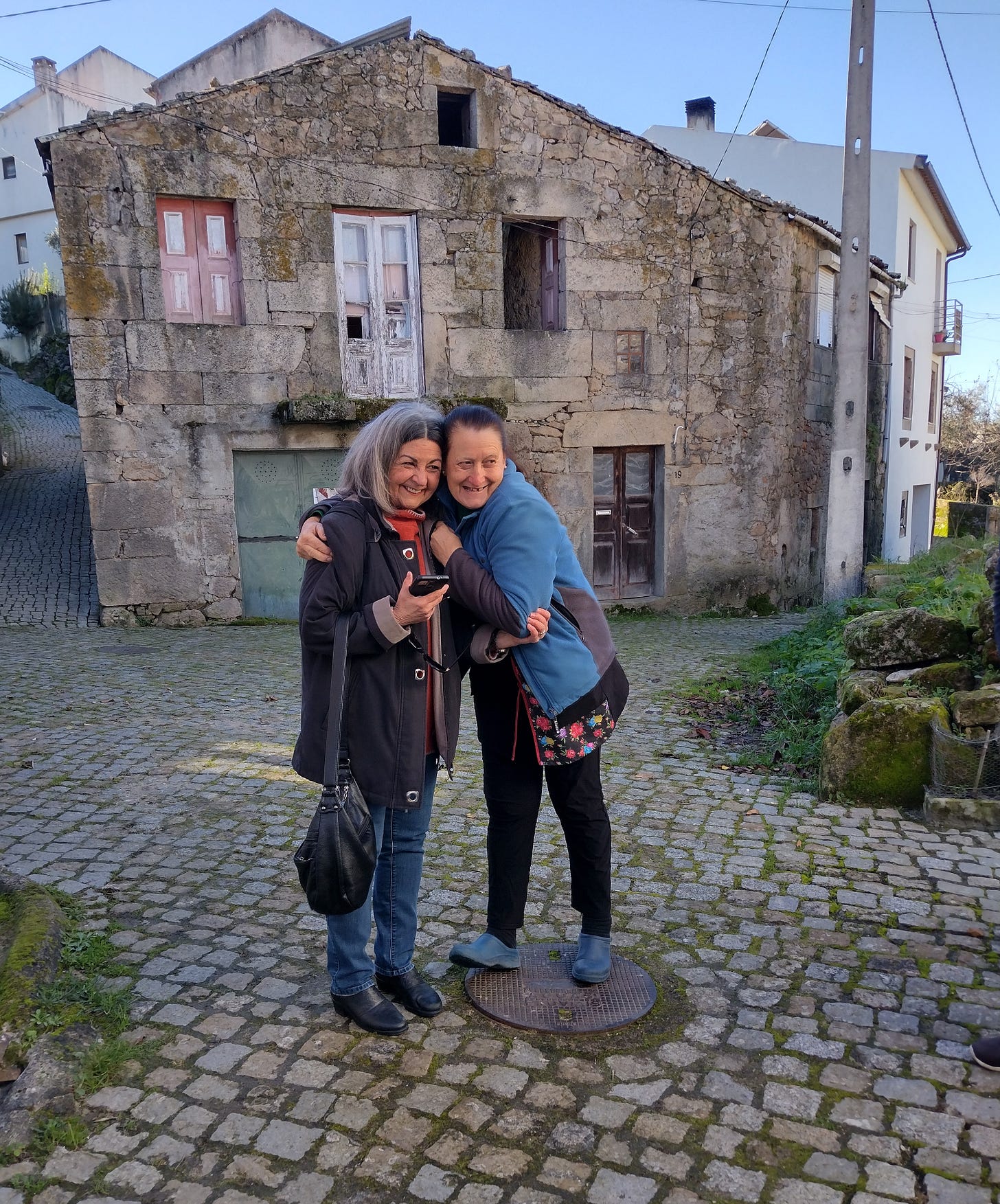
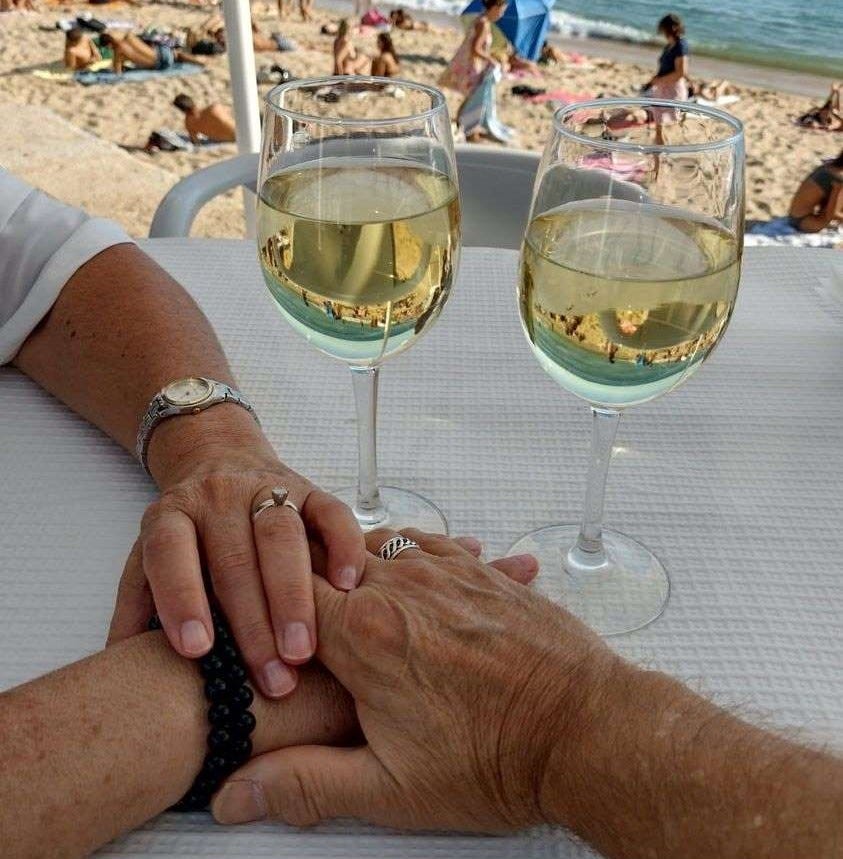
Hi Carol
Been meaning to write to you for ages. We are a British (with some Ameircan) couple living in the Alentejo (for the last 8 years), but speak fluent Portuguese because of 24 years in Brazil. Stayed in the hotel you recommended recently in Praça de Luís Camões, and loved it, thanks.
Anyway, wondered if you´d like to visit the Alentejo, or if you´d like to meet up... I´ve done a fair bit of translation in live situations... have you got someone who can go with you to Viseu next time?? Anyway, up to you.
If you want to know more about me, here is a link to my daily photo blog: https://www.blipfoto.com/entry/3191877444462184081
(Btw, imagine the discussion about you in the village will be because you probably have rights to that stone house.)
I love that your persistence was rewarded, Carol, and that the whole endeavor has inspired to improve your Portuguese.
When my husband was researching his Portuguese roots in Hawaii, he would bring malasadas to the nuns and we would happily have access to church records and cemeteries. :) And in one, after coming up dry so many times, he actually tripped over a headstone that was partially raised up but had been hidden by overgrowth. It turned out to be his great grandmother Jacinta's s grave!